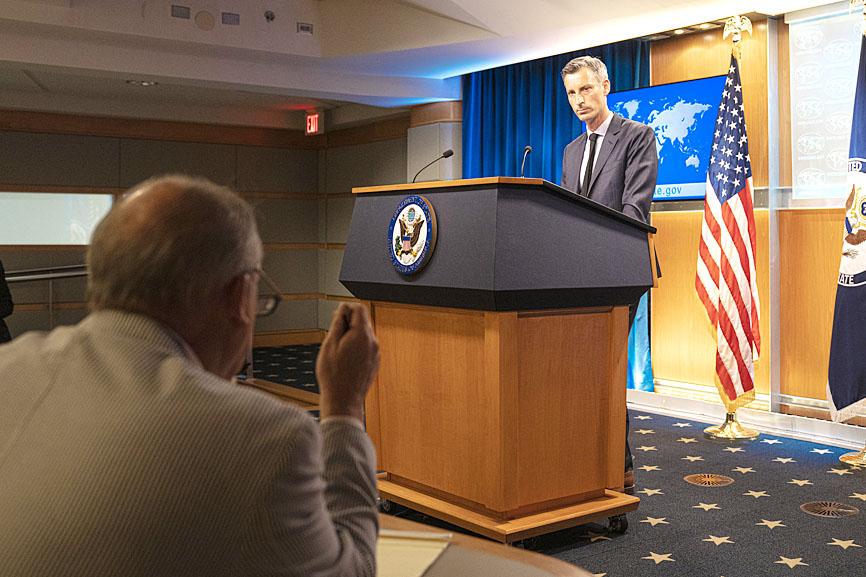Washington supports its European partners and allies as they develop mutually beneficial relations with Taiwan, the US Department of State said on Tuesday, adding that each country should be able to interpret its own “one China” policy.
US Department of State spokesman Ned Price made the remarks at a news conference when asked to comment on China demanding Lithuania to withdraw its ambassador from Beijing earlier that day.
In Taipei, the Ministry of Foreign Affairs on July 20 announced its plan to establish a representative office in Lithuania — the first office in Europe to have “Taiwanese” in its name.

Photo courtesy of the US Department of State’s Asia Pacific Media Hub
Lithuania plans to open a representative office in Taiwan by this fall, although the two nations do not have formal diplomatic ties.
“Well, we do stand in solidarity with our NATO ally Lithuania and we condemn the PRC’s [People’s Republic of China] recent retaliatory actions, including the recall of Beijing’s ambassador from Vilnius and demanding Lithuania recall its ambassador from Beijing,” Price said.
“Taiwan is a global leader in public health and advanced manufacturing and democratic governance, to name just a few areas in which the international community — including the United States — benefits from engagement with Taiwan,” he added.
“Each country should be able to determine the contours of its own ‘one China’ policy without outside coercion. We have done just that,” he said.
Asked what actions the US expects Japan to take to keep stability across the Taiwan Strait — after US Secretary of State Antony Blinken and Japanese National Security Adviser Akiba Takeo met in Washington on Monday — Price reiterated the US’ support for a peaceful resolution of cross-strait relations.
“We have urged Beijing ... to cease its military, its diplomatic, its economic pressure against Taiwan and to engage in meaningful dialogue with Taiwan,” Price said.
In Taipei, the foreign ministry said it welcomed Washington’s comments.
The ministry thanked US President Joe Biden’s administration for continuously supporting Taiwan, and backing Taiwan and Lithuania in establishing representative offices in each other’s countries, ministry spokeswoman Joanne Ou (歐江安) said in a statement yesterday.
Taiwan would continue to develop practical and mutually beneficial relations with all like-minded countries, without flinching under outside coercion, she added.
On Tuesday, the Lithuanian Ministry of Foreign Affairs expressed regret over Beijing’s move to recall its ambassador, but said that the country is determined to pursue mutually beneficial ties with Taiwan, like many other countries in the EU and around the world.
If Lithuania does not cease its engagements with Taiwan, it is not impossible that China and Lithuania might sever relations, Liu Zuokui (劉作奎), director of the Chinese Academy of Social Sciences’ Department of Central and Eastern European Studies, told the Chinese-language Global Times on Tuesday.
Nabila Massrali, spokeswoman for the European External Action Service, the EU’s diplomatic body, told the Central News Agency that while the ambassador recall was a bilateral matter between China and Lithuania, developments in Beijing’s ties with individual EU members “inevitably have an impact on overall EU-China relations.”
“We regret the Chinese action, and are following developments closely,” Massrali said in a statement.

Conflict with Taiwan could leave China with “massive economic disruption, catastrophic military losses, significant social unrest, and devastating sanctions,” a US think tank said in a report released on Monday. The German Marshall Fund released a report titled If China Attacks Taiwan: The Consequences for China of “Minor Conflict” and “Major War” Scenarios. The report details the “massive” economic, military, social and international costs to China in the event of a minor conflict or major war with Taiwan, estimating that the Chinese People’s Liberation Army (PLA) could sustain losses of more than half of its active-duty ground forces, including 100,000 troops. Understanding Chinese

The Ministry of Foreign Affairs (MOFA) yesterday said it is closely monitoring developments in Venezuela, and would continue to cooperate with democratic allies and work together for regional and global security, stability, and prosperity. The remarks came after the US on Saturday launched a series of airstrikes in Venezuela and kidnapped Venezuelan President Nicolas Maduro, who was later flown to New York along with his wife. The pair face US charges related to drug trafficking and alleged cooperation with gangs designated as terrorist organizations. Maduro has denied the allegations. The ministry said that it is closely monitoring the political and economic situation

UNRELENTING: China attempted cyberattacks on Taiwan’s critical infrastructure 2.63 million times per day last year, up from 1.23 million in 2023, the NSB said China’s cyberarmy has long engaged in cyberattacks against Taiwan’s critical infrastructure, employing diverse and evolving tactics, the National Security Bureau (NSB) said yesterday, adding that cyberattacks on critical energy infrastructure last year increased 10-fold compared with the previous year. The NSB yesterday released a report titled Analysis on China’s Cyber Threats to Taiwan’s Critical Infrastructure in 2025, outlining the number of cyberattacks, major tactics and hacker groups. Taiwan’s national intelligence community identified a large number of cybersecurity incidents last year, the bureau said in a statement. China’s cyberarmy last year launched an average of 2.63 million intrusion attempts per day targeting Taiwan’s critical

AGING: As of last month, people aged 65 or older accounted for 20.06 percent of the total population and the number of couples who got married fell by 18,685 from 2024 Taiwan has surpassed South Korea as the country least willing to have children, with an annual crude birthrate of 4.62 per 1,000 people, Ministry of the Interior data showed yesterday. The nation was previously ranked the second-lowest country in terms of total fertility rate, or the average number of children a woman has in her lifetime. However, South Korea’s fertility rate began to recover from 2023, with total fertility rate rising from 0.72 and estimated to reach 0.82 to 0.85 by last year, and the crude birthrate projected at 6.7 per 1,000 people. Japan’s crude birthrate was projected to fall below six,